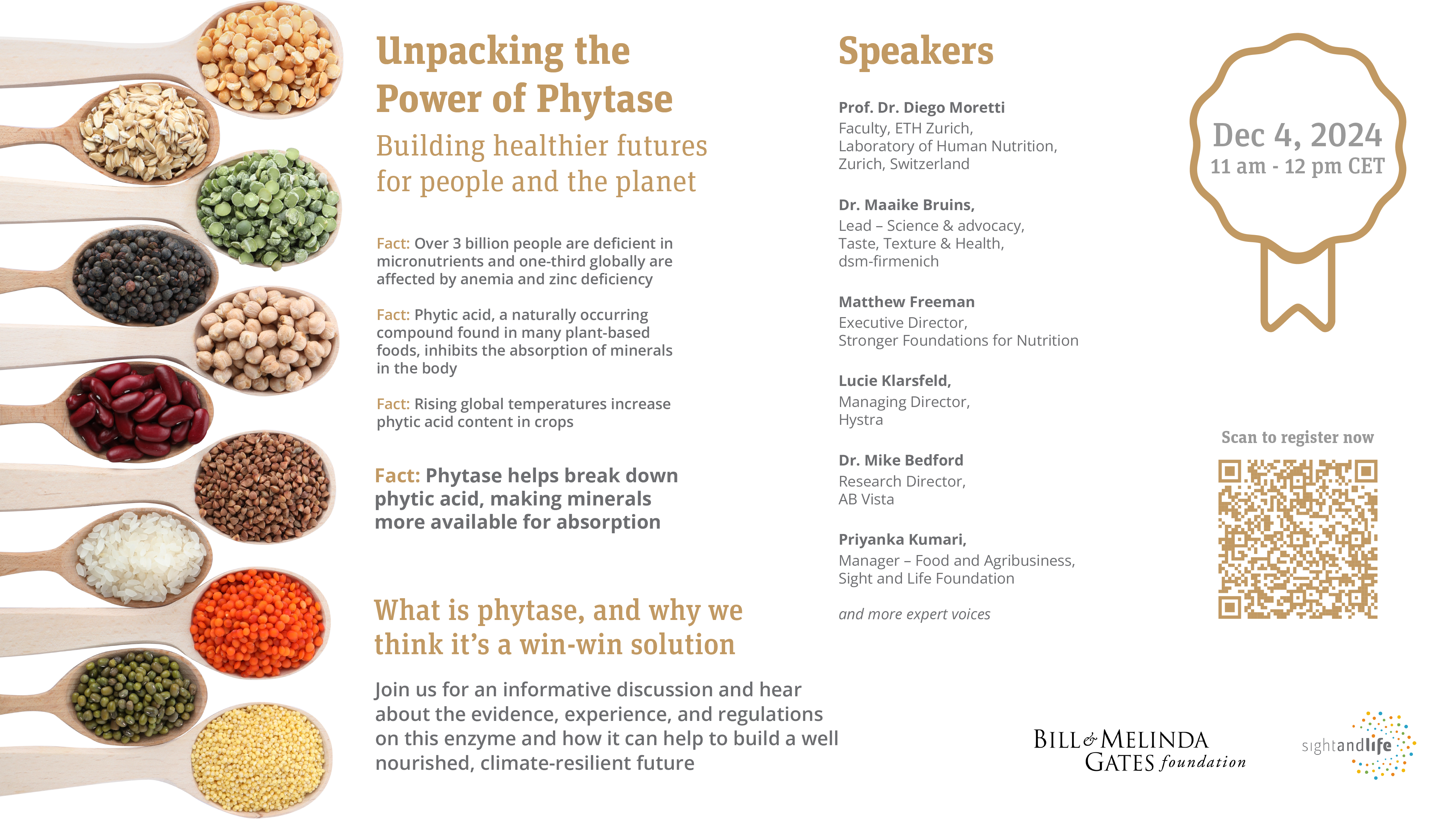Unpacking the Power of Phytase: Building Healthier Futures for People and the Planet

More than 3 billion people are affected by micronutrient deficiencies, and one-third of the world's population suffers from anemia and zinc deficiency, particularly in developing countries. Mineral absorption is crucial for nutrient uptake, preventing deficiencies, maintaining mineral balance, supporting growth and development, and enhancing overall health. Inadequate mineral intake and absorption can lead to deficiencies; for example, a lack of iron may cause iron deficiency and iron deficiency anemia.
Phytic acid is a naturally occurring compound found in many plant-based foods which serves as the primary way phosphorus is stored in plant tissues, especially in grains, seeds, nuts, and legumes. Phytic acid has anti-nutrient properties which inhibit the absorption of certain minerals in the body. Consumption of foods high in phytic acid binds minerals such as Iron, Zinc, Calcium, and Magnesium in the digestive tract, thereby making them less available for absorption by the body.
Phytase is an enzyme that improves mineral absorption from phytic acid-rich foods such as whole grains, pulses, (soy) beans, maize, etc.). Phytase treatment can enhance mineral bioavailability (e.g., iron, zinc, calcium) by reducing the phytic acid content in foods, and as such helps prevent mineral deficiencies and associated health problems. While already widely used in animal feed to enhance phosphorus utilization, emerging research explores the application of phytase to improve mineral absorption in humans, especially in phytic acid-rich diets.
Event objectives
We will build conversations and establish networks with stakeholders in the phytase space. Specifically, the aim is to:
- Provide participants with foundational knowledge about phytase, its enzymatic function, and its role in breaking down phytate
- Explore the benefits of phytase addition in human nutrition
- Identify, map, and engage industry experts and stakeholders looking to work or already working on phytase in human nutrition

Unpacking the Power of Phytase: Building Healthier Futures for People and the Planet
More than 3 billion people are affected by micronutrient deficiencies, and one-third of the world's population suffers from anemia and zinc deficiency, particularly in developing countries. Mineral absorption is crucial for nutrient uptake, preventing deficiencies, maintaining mineral balance, supporting growth and development, and enhancing overall health. Inadequate mineral intake and absorption can lead to deficiencies; for example, a lack of iron may cause iron deficiency and iron deficiency anemia.
Phytic acid is a naturally occurring compound found in many plant-based foods which serves as the primary way phosphorus is stored in plant tissues, especially in grains, seeds, nuts, and legumes. Phytic acid has anti-nutrient properties which inhibit the absorption of certain minerals in the body. Consumption of foods high in phytic acid binds minerals such as Iron, Zinc, Calcium, and Magnesium in the digestive tract, thereby making them less available for absorption by the body.
Phytase is an enzyme that improves mineral absorption from phytic acid-rich foods such as whole grains, pulses, (soy) beans, maize, etc.). Phytase treatment can enhance mineral bioavailability (e.g., iron, zinc, calcium) by reducing the phytic acid content in foods, and as such helps prevent mineral deficiencies and associated health problems. While already widely used in animal feed to enhance phosphorus utilization, emerging research explores the application of phytase to improve mineral absorption in humans, especially in phytic acid-rich diets.
Event objectives
We will build conversations and establish networks with stakeholders in the phytase space. Specifically, the aim is to:
- Provide participants with foundational knowledge about phytase, its enzymatic function, and its role in breaking down phytate
- Explore the benefits of phytase addition in human nutrition
- Identify, map, and engage industry experts and stakeholders looking to work or already working on phytase in human nutrition
Discover more
Partner with us
Know how we can join hands to eradicate malnutrition
Connect with us
Share your ideas, requests, and feedback
News & announcements
Find out what is new at Sight and Life
Join the team
Find the right role for you to grow and deliver impact



